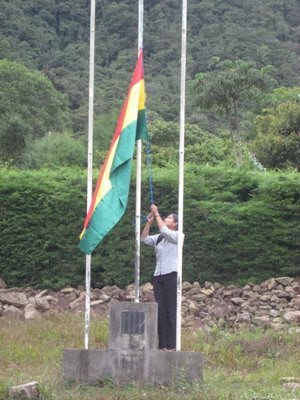When a group of soil professors from South Dakota State University visited the UAC-CP two months ago, they emerged from an afternoon workshop raving about Agronomy thesis student Veronica Calles. Dr. Diane Rickerl told me that 23-year-old Veronica's ability to fend off a barrage of questions from four PhDs was nothing short of impressive.

On our trip to Sorata last weekend, Veronica, myself, and a couple other UAC-CP grads went on a hike to the river where we sat and ate freshly picked peaches.
As someone who knows next to nothing about soil--or science, for that matter, I can't speak much to Veronica's academic skills or the thesis she plans to defend this year ("Production of Biomas in Two Agro-forest Systems Implemented in an Ex-coca Field in the Community of Coroico Viejo"*). But I can speak to Veronica's character; I'm a witness to her maturity, her tenacity, her sensitivity, grace, and heart. She´s as beautiful on the inside as she is on the outside.
Veronica is from the small community of Santana near Coroico. The fifth of six children, she is, like most UAC-CP students, a first-generation high school graduate and the first person in her family to attend college.
She comes from a poor family that has made a living growing citrus fruits, coffee, and coca. It's a bold understatement to say that money was "tight" in the Calles household, but Veronica insists that when it came to the basic necessities, she and her siblings never went without. "We always had something to eat," she said. "And we might not have had nice, new clothes, but we always had something to cover our bodies." Needless to say, higher education, even with the UAC-CP's subsidized tuition, was out of the question.
 Veronica on top of the world--or standing on top of a woodpile, at least.
Veronica on top of the world--or standing on top of a woodpile, at least.
"I didn't know where I could study or how I could possibly afford it," she told me as we sat in a park in Sorata last week. "In the campo," she explained, "normally this is the problem. Parents don't have the money to help their children. So, students finish high school, or sometimes they don't even finish high school, and they just stay at home and live." With limited opportunities, Veronica said, young people feel they have no future.
But Veronica was determined to make a future for herself. Always very involved in the local church's pastoral/youth programs, she developed strong relationships with priests and nuns who helped her obtain a scholarship to come to the UAC-CP. This financial assistance helped Veronica during her first year at the UAC-CP; her second year she was awarded a scholarship from USAID that allowed her to stay and study.
"I think it would've been really difficult [to study at the College] without the scholarship. I don't know that I would've been able to finish college if I didn't have the scholarship because I wouldn't have been able to afford it," she admitted. "I might have had to return home."
Instead, she has risen to the top of her class. In January 2008, in fact, Veronica was chosen to represent the entire College as a participant in the 5-week-long Winter Institute for Young Indigenous Leaders. The program, sponsored by the U.S. Department of State, brought her and several other young, budding leaders from South America to Arizona, Massachusettes, New York, and Washington, D.C., to talk about culture, democracy, and leadership--particularly as it relates to being an indigenous person. The experience connected her with the Fullbright program through which she's currently doing a three-month-long internship at the U.S. Embassy in La Paz.
When I look at Vero, as she's affectionately called by her UAC-queña familia, I see an exceptional young person who has defied incredible odds...especially considering that she is a woman. "There are very few opportunities for women to be educated as professionals in the rural area," she said. "But I think this is changing, especially because of places like the UAC-CP where I see women now saying, 'I have the same rights as a man.'"
After listening to her speak so eloquently about such topics as women´s rights and soil science and her desire to get a master´s degree in environmental science, I suggested that she is unique; not a typical woman from the campo. Veronica agreed. "I've thought the same thing about myself," she said, almost bewildered. "I've asked myself, 'Why am I different?'" She credits both her parents who, she says, made every sacrifice to ensure that all of their children were educated.
Sadly, her mother won't get to see her graduate from college. Veronica's mom died very suddenly in April 2005 at the age of 45. It is a loss that, unsurprisingly, is still very painful for Vero. We both cried when she talked about her mother's death. But, she is now sure her mother is with her more than ever. "Wherever I go, I feel her presence."
Her father, however, will be able to see his daughter defend her thesis. "My dad isn't a person who expresses his feelings, but I know he's happy with me because I am going to be the first in the family [to graduate from college]...and this brings pride and honor to everyone."
"And me?" she asked, with her trademark smile spread across her face. "I am really happy. At the UAC-CP, so many doors have opened for me. If I hadn't been able to study at the College, if I hadn't been able to finish my studies," she paused. "I don't know..."
*Did I translate that thesis title correctly, Hugh??


















